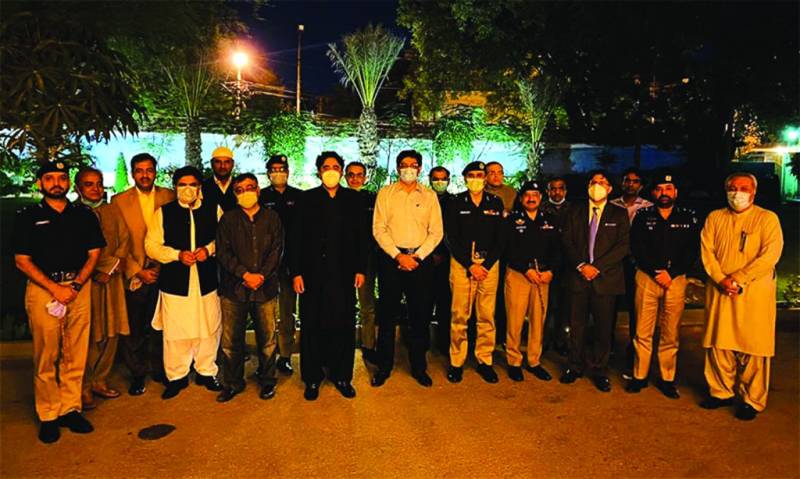
The kidnapping of Sindh police chief at gun point in wee hours of Monday, forcing him to sign arrest orders of a politician and the subsequent reaction of an organized and armed law enforcing agency has no parallel in the history of the country. Such a premeditated attack on a law enforcing agency by another law enforcing agency is unheard of even in a banana republic. War lords in countries having civil wars are known to kidnap states’ security personnel but they are essentially private armed groups, not state institutions. For the first time in Pakistan, an organized paramilitary force has acted like a private militia run by a war lord according to whims, not according to the law.
The question that now must be answered is: what next?
What happened on Monday is now well known and bears no repetition. It became known fairly early that Captain Safdar had been arrested for violating the law relating to the preservation of the Mazar e Quaid. The slogans ‘vote ko izzat do’ he had raised were interpreted as violating the sanctity of the Quaid’s mausoleum. There was, however, no clarity as to who had ordered the registering of such a flimsy case and arrest. No one thought of what could have actually happened in the hours leading up to the midnight raid and force breaking the hotel room of Captain Safdar where he was staying with his wife Maryam Nawaz.
Thanks to Bilawal Bhutto Zardari’s press conference later that day, which tore apart the shroud of secrecy, replacing murmurs in hushed tones with loud and thunderous protestations. Earlier the social media reported Chief Minister Murad Ali Shah, in a telephonic talk with a PML-N leader, had distanced the provincial government from Safdar’s arrest. But there still was confusion about what actually had happened.
Bilawal’s press conference made it abundantly clear that the top commander of the Sindh police found his house besieged at 2 AM. Guess, by whom? No other than the paramilitary force the Rangers, which is supposed to assist the police in law enforcement, had not only besieged the official residence of the top cop but also kidnapped him to some undisclosed location. Reportedly he was brought to a sector commander’s office and asked to sign papers authorizing PML-N leader’s arrest.
It is anybody’s guess why it was done. An obvious reason seems to sow seeds of mistrust between PML-N and PPP and by corollary create a division in the recently cobbled opposition alliance of PDM. If this indeed was the case, what does it mean?
It means that a uniformed, duly armed federal paramilitary force allowed itself to be used illegally for a blatantly political end. It did not matter if in doing so, the federal paramilitary force had to even abduct the top commander of the province’s law enforcement agency. It was a mere nicety that could be dispensed with for a larger political purpose the paramilitary force wanted to achieve. But in doing so it forgot its implications.
All officers of the Rangers from top to the bottom are commissioned officers of Pakistan Army. They are all beholden to the GHQ for their career progression and submit to disciplining by it. Nominally they are placed under the Interior Ministry but it is just like the FC in Khyber Pakhtunkhwa or in Balochistan also similarly placed under the Interior Ministry. Complaints about the FC, particularly in Balochistan, acting beyond official remit in utter disregard of the provincial government or the federal interior ministry are well known.
By allowing itself to be used illegally for a political purpose, the Rangers only lent credence to the charge that the army acted like ‘a state within state.’ Unwittingly the narrative that has been building for quite some time past and which gained currency during PDM jalsas has been further strengthened. It acquired overtones not known before. Merely regurgitating that no general in the army harbors political ambitions or dismissing ‘state within state’ as part of 5G war launched by the enemy will not wash the mud that has stuck so deeply.

It must be acknowledged that the Sindh police reacted in a professional and dignified manner. Without their reaction, it would not be possible to even think of ‘what next’ to revert to a normal state. Applying en masse for leave for this humiliation of their force, they served a befitting slap on the face.
Thank God that further snowballing and a potential situation of two armed forces standing eyeball to eyeball with guns in hand has been averted. But let there be no doubt or mistake that it is only of temporary nature. Leave requests have been deferred for ten days only.
The army chief has ordered an inquiry but only after the Sindh police seemed to rise en masse. It is hard to believe that he would have been unaware of what had happened even before signs of police revolt became clear. The corps commander who has been asked to hold inquiry may be an officer of great personal integrity but he belongs to the same officer cadre of the army to which the Rangers officers also belong. However well intentioned, the inquiry is no more than internal in character.
Any perception of mishandling the inquiry or attempts at hushing up will be sowing seeds of a disaster, if not now then at some later stage. It is best to avoid it. Right decisions at the right time hold the key. There is no substitute to a judicial probe. The sooner the better. A decision delayed is not a problem avoided, it is a crisis invited.
The writer is a former senator
The question that now must be answered is: what next?
What happened on Monday is now well known and bears no repetition. It became known fairly early that Captain Safdar had been arrested for violating the law relating to the preservation of the Mazar e Quaid. The slogans ‘vote ko izzat do’ he had raised were interpreted as violating the sanctity of the Quaid’s mausoleum. There was, however, no clarity as to who had ordered the registering of such a flimsy case and arrest. No one thought of what could have actually happened in the hours leading up to the midnight raid and force breaking the hotel room of Captain Safdar where he was staying with his wife Maryam Nawaz.
Thanks to Bilawal Bhutto Zardari’s press conference later that day, which tore apart the shroud of secrecy, replacing murmurs in hushed tones with loud and thunderous protestations. Earlier the social media reported Chief Minister Murad Ali Shah, in a telephonic talk with a PML-N leader, had distanced the provincial government from Safdar’s arrest. But there still was confusion about what actually had happened.
Bilawal’s press conference made it abundantly clear that the top commander of the Sindh police found his house besieged at 2 AM. Guess, by whom? No other than the paramilitary force the Rangers, which is supposed to assist the police in law enforcement, had not only besieged the official residence of the top cop but also kidnapped him to some undisclosed location. Reportedly he was brought to a sector commander’s office and asked to sign papers authorizing PML-N leader’s arrest.
It is anybody’s guess why it was done. An obvious reason seems to sow seeds of mistrust between PML-N and PPP and by corollary create a division in the recently cobbled opposition alliance of PDM. If this indeed was the case, what does it mean?
It means that a uniformed, duly armed federal paramilitary force allowed itself to be used illegally for a blatantly political end. It did not matter if in doing so, the federal paramilitary force had to even abduct the top commander of the province’s law enforcement agency. It was a mere nicety that could be dispensed with for a larger political purpose the paramilitary force wanted to achieve. But in doing so it forgot its implications.
By allowing itself to be used illegally for
a political purpose, the Rangers only lent credence to the charge that the army acted
like ‘a state within state’
All officers of the Rangers from top to the bottom are commissioned officers of Pakistan Army. They are all beholden to the GHQ for their career progression and submit to disciplining by it. Nominally they are placed under the Interior Ministry but it is just like the FC in Khyber Pakhtunkhwa or in Balochistan also similarly placed under the Interior Ministry. Complaints about the FC, particularly in Balochistan, acting beyond official remit in utter disregard of the provincial government or the federal interior ministry are well known.
By allowing itself to be used illegally for a political purpose, the Rangers only lent credence to the charge that the army acted like ‘a state within state.’ Unwittingly the narrative that has been building for quite some time past and which gained currency during PDM jalsas has been further strengthened. It acquired overtones not known before. Merely regurgitating that no general in the army harbors political ambitions or dismissing ‘state within state’ as part of 5G war launched by the enemy will not wash the mud that has stuck so deeply.

It must be acknowledged that the Sindh police reacted in a professional and dignified manner. Without their reaction, it would not be possible to even think of ‘what next’ to revert to a normal state. Applying en masse for leave for this humiliation of their force, they served a befitting slap on the face.
Thank God that further snowballing and a potential situation of two armed forces standing eyeball to eyeball with guns in hand has been averted. But let there be no doubt or mistake that it is only of temporary nature. Leave requests have been deferred for ten days only.
The army chief has ordered an inquiry but only after the Sindh police seemed to rise en masse. It is hard to believe that he would have been unaware of what had happened even before signs of police revolt became clear. The corps commander who has been asked to hold inquiry may be an officer of great personal integrity but he belongs to the same officer cadre of the army to which the Rangers officers also belong. However well intentioned, the inquiry is no more than internal in character.
Any perception of mishandling the inquiry or attempts at hushing up will be sowing seeds of a disaster, if not now then at some later stage. It is best to avoid it. Right decisions at the right time hold the key. There is no substitute to a judicial probe. The sooner the better. A decision delayed is not a problem avoided, it is a crisis invited.
The writer is a former senator

